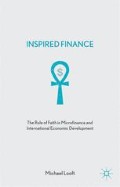Abstract
The previous chapter covered economic development issues rooted in the Protestant Ethic, with a particular focus on American influences in microfinance. This chapter covers issues where theological threads present a more explicit and overt challenge to economic development for the poor. The first section will touch upon issues in microfinance related to religion, gender, and culture. The second section will focus on the Prosperity Gospel and how its view of economic development has challenged the role and authority of traditional African religions. The final section presents a case study on the bonyads, religious foundations in the Iranian republic tasked with economic development for the poor. The purpose of the case study is to illuminate drawbacks stemming from state-run, theological economic development programs that lack transparency.
Access this chapter
Tax calculation will be finalised at checkout
Purchases are for personal use only
Preview
Unable to display preview. Download preview PDF.
Notes
Grameen Bank, “Grameen Bank at a Glance,” http://www.grameen-info.org/index.php?option=com_content&task=view&id=26&Itemid=0 (accessed 31 December 2013.
Muhammad Yunus, Banker to the Poor (New York: Public Affairs, 2003), 46.
Beatriz Armendáriz de Aghion and Jonathan Morduch, The Economics of Microfinance (Cambridge, MA: MIT Press, 2005), 190.
Martha Nussbaum, Women and Human Development: The Capabilities Approach (New York: Cambridge University Press, 2000), 43.
Regina Galang et al.: “John F Kennedy School of Government Case Study: The Social Construction of Gender: Microfinance and fa’afafines in Samoa.” 2005, 1–2.
Stuart, Guy: “John F Kennedy School of Government Case Study: Caste Embeddedness and Microfinance: Savings and Credit Cooperatives in Andhra Pradesh, India,” September 2006, Available at: http://research.hks.harvard.edu/uublications/getFile.asux?Id=230. 13.
Lindsay Jones, “African Cosmologies,” in Encyclopedia of Religion, 2nd ed. (Detroit: Macmillan Reference USA, 2005).
Stephen Ellis and Gerrie Ter Haar, Worlds of Power: Religious Thought and Political Practice in Africa (New York: Oxford University Press, 2004), 118.
Ellis and Ter Haar, Worlds of Power, 120, quoted in Sharon E. Hutchison, Nuer Dilemmas: Coping with money, war and the state (Berkeley: University of California Press, 1996), 56.
Ellis and Ter Haar, Worlds of Power, 117, quoted in Joshua N. Kudadjie, Moral Renewal in Ghana: Ideals, Realities and Possibilities (Accra: Asempa Publishers, 1995).
Ellis and Ter Haar, Worlds of Power, 155, quoted in K. Moses Nagbe, “Liberia: A Land of the Magic God,” Daily Observer [Monrovia], 10, 76, and 12 June 1990.
Samuel O. Abogunrin (Gen. Editor), J.O. Akao, D.O. Akintunde, D. Kunle, G.N. Toryough and P.A. Oguntoye (2007) (Eds) Biblical Studies and Corruption in Africa. Biblical Studies Series No.6. Ibadan: NABIS, p. 654.
See Jim Bakker and Ken Abraham, I was wrong (Nashville: T. Nelson, 1996).
Ogbu Kalu, Power, Poverty, and Prayer: The Challenges of Poverty and Pluralism in African Christianity, 1960–1996 (Frankfurt: Peter Lang GmbH, 2000), 127.
Jacob Olupona, “On Africa, A Need for Nuance,” Harvard Divinity Bulletin, Autumn 2007, 41.
William Easterly, White Man’s Burden: Why the West’s Efforts to Aid the Rest Have Done So Much Ill and So Little Good (New York: Penguin Books, 2006), 375.
Suzanne Maloney, “Politics, Patronage, and Social Justice: Parastatal Foundations and Post-Revolutionary Iran,” Ph.D. Dissertation (The Fletcher School of Law and Diplomacy, 2001), 183.
Anthony Parsons, The Pride and the Fall: Iran, 1974–1979 (London: Jonathon Cape, 1984), 29.
Thierry Coville, The Economy of Islamic Iran: Between State and Market (Louvain: Institut Français de Recherche en Iran, 1994), 45.
Eliyahu Kanovsky, Iran’s Economic Morass: Mismanagement and Decline under the Islamic Republic, Policy papers; no. 44 (Washington, DC: Washington Institute for Near East Policy, 1997).
Afshin Molavi, The Soul of Iran (New York: Norton, 2005), 176.
International Monetary Fund, “Islamic Republic of Iran: Staff Report for the 2004 Article IV Consultation,” IMF Country Report 04/306 (Washington, DC, September 2004), 46.
Keith Crane, Rollie Lal, and Jeffrey Martini, Iran’s Political, Demographic, and Economic Vulnerabilities (Arlington, VA: Rand Corporation, 2008), 81.
Abbas Bakhtiar, “Ahmadinejad’s Achilles Heel: The Iranian Economy,” 25 January 2007, Payvand’s Iran News, http://www.payvand.com/news/07/ jan/1295.html#_edn7 (accessed 4 January 2014).
Transparency International, “Corruption Perceptions Index 2012,” http://cpi.transparency.org/cpi2012/results/ (accessed 2 January 2014).
Author information
Authors and Affiliations
Copyright information
© 2014 Michael Looft
About this chapter
Cite this chapter
Looft, M. (2014). Theology and Development. In: Inspired Finance. Palgrave Macmillan, London. https://doi.org/10.1057/9781137450784_5
Download citation
DOI: https://doi.org/10.1057/9781137450784_5
Publisher Name: Palgrave Macmillan, London
Print ISBN: 978-1-349-49709-6
Online ISBN: 978-1-137-45078-4
eBook Packages: Palgrave Economics & Finance CollectionEconomics and Finance (R0)

